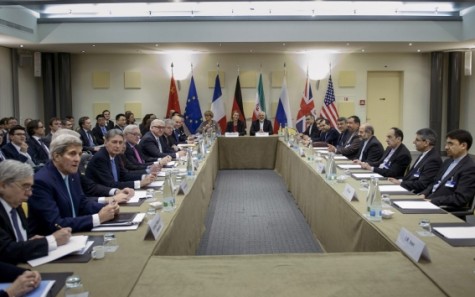PHOTO: Plenary nuclear talks between Iran and the 5+1 Powers on Tuesday morning
WEDNESDAY FEATURES
Analysis: Why A Nuclear Deal Might Overcome Opposition in Washington
How to Condemn the Death Penalty….Without Mentioning Your Own Country
UPDATE 1845 GMT: State Department spokeswoman Marie Harf says negotiations will continue on Thursday, with US Secretary of State John Kerry remaining in Lausanne: “We continue to make progress but have not reached a political understanding.”
Cont to make progress; have not reached a pol understanding. @JohnKerry will remain in Lausanne until at least Thurs AM to cont negotiations
— Marie Harf (@marieharf) April 1, 2015
UPDATE 1215 GMT: Iran’s lead negotiator, Deputy Foreign Minister Abbas Araqchi, has restated, “It is not possible to have a deal without lifting sanctions, all sanctions must be removed.”
Speaking with journalists on Wednesday, Araqchi offered a limited space for negotiations by saying that it would be difficult “to see all sanctions removed all at once”. However, he set out the essential requirement for “the lifting of major economic and oil embargoes”: “The type and the entity by which the sanctions have been imposed are very variable, they must be distinguished, but we insist that in the first step of the agreement all economic, financial, oil and banking sanctions must be lifted.”
That appears to be a demand that the European Union’s restrictions of July 2012, which crippled Iran’s oil exports and financial sector, should be removed soon after a comprehensive nuclear deal.
Araqchi asserted that the removal of sanctions should be based on a “clear and precise perspective, otherwise there would definitely be no deal”.
“Until we have solutions to all problems we cannot have a comprehensive agreement,” he said.
Failing to issue a general agreement by an informal Tuesday deadline, Iran and the 5+1 Powers (US, Britain, Russia, China, France, and Germany) have extended nuclear talks in Switzerland through today.
Iranian Foreign Minister Mohammad Javad Zarif told reporters after discussions ended at 1:30 a.m.:
We have accomplished quite a bit but people needed to get some rest and start over early in the morning.
I hope that we can finalize the work on Wednesday and hopefully start the process of drafting [the general agreement.
Amid the last-minute talks on Tuesday, Western diplomats put out the story that a general statement, rather than an agreement on General Principles, would be issued by midnight. They said the statement would be supported by detailed documents on areas of technical agreement.
However, the Iranians denied the report, saying nothing had been decided.
Iran and the 5+1 appear to be divided over several important issues, including Tehran’s research-and-development nuclear centrifuges; shipment of Iranian low-enriched uranium out of the country; the timing of the removal of US-led and UN sanctions; and the duration of an agreement.
The formal deadline for a comprehensive deal is July 1; however, the US said earlier this year that a General Framework must be agreed by March 31.
US State Department spokeswoman Marie Harf acknowledged the extension was arranged because of “several difficult issues” that had not been resolved.
Russian Foreign Minister Sergei Lavrov returned to the discussions on Tuesday — reportedly after unsettling the 5+1’s position on UN sanctions by saying that all of them must be removed soon after a deal is agreed — and the French and German Foreign Ministers have apparently delayed plans to leave Lausanne this morning.
However, Chinese Foreign Minister Wang Xi offered a pessimistic signal by departing Switzerland for Beijing on Tuesday.

